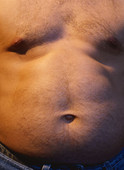- 7 Best Breads for Maintaining Stable Blood Sugar
- Gelatin vs. Collagen: Which is Best for Skin, Nails, and Joints?
- The Long-Term Effects of Daily Turmeric Supplements on Liver Health
- Could Your Grocery Store Meat Be Causing Recurring UTIs?
- Are You Making This Expensive Thermostat Error This Winter?
- Recognizing the Signs of Hypothyroidism
- 10 Strategies to Overcome Insomnia
- Could Artificial Sweeteners Be Aging the Brain Faster?
- Techniques for Soothing Your Nervous System
- Does the Water in Your House Smell Funny? Here’s Why
Gut Bugs May Hold Key to Weight Control, Mouse Study Suggests


THURSDAY, Sept. 5The bacteria living in your digestive system may be the last thing on your mind, but a new study in mice raises the prospect that obese people might get benefits through the transfer of a thinner person’s gut germs.
The research is preliminary, and there are a variety of obstacles, including as-yet-unknown side effects in people, cost and the “ick” factor. “Fecal transplants” are now used to treat people with an intestinal disorder, and they’re not for the faint of heart (or stomach).
Still, the findings from researchers at the University of Colorado reveal the potential promise of the approach.
In the future, there may be “a way to swap bacteria that’s not gross,” said Justin Sonnenburg, an assistant professor at the Stanford University School of Medicine. “There may even someday be a pill you could take.”
At issue are the germs that live within your body and help you digest food, among other things. The bacteria live in communities, and “there’s a huge, increasing interest in understanding these communities at a fundamental level,” Sonnenburg said. “That way, we can prevent diseases they’re associated with.”
The new study looked at what might happen if germs from a thinner person were transferred into an obese person.
They took fecal bacteria from four sets of adult, female, human twins in which one sister was obese (a step above simply being overweight), and then transplanted the germs into mice. They then fed the mice various diets, including some meant to represent the typical unhealthy American diet.
“[The results] show that mice that get microbes from obese individuals gain more weight than those that get microbes from lean individuals,” said study co-author Rob Knight, an associate professor at the University of Colorado at Boulder. “In other words, the weight gain can be transmitted from humans to mice by transferring their microbes.”
There’s another twist: Mice like to eat each other’s feces, so they naturally transferred fecal bacteria to each other. The mice with germs from the obese twins appeared to be affected by their counterparts with germs from thinner twins and actually gained less weight.
But the opposite wasn’t the case. And, the researchers found, a typical high-fat, American-style diet seemed to eliminate the benefits for the obese-twin mice of eating the feces of their thinner twin counterparts.
What does this all mean? It’s possible to disrupt weight gain by transferring gut bacteria and to use mice to understand more about the germs inside humans, Knight said. Results of animal studies, however, often don’t translate to humans.
The study, which appears in the Sept. 6 issue of the journal Science, was funded in part by the food company Kraft, the U.S. National Institutes of Health and the Crohn’s and Colitis Foundation of America.
More information
For more on obesity, try the U.S. National Library of Medicine.
Source: HealthDay
Copyright © 2026 HealthDay. All rights reserved.










